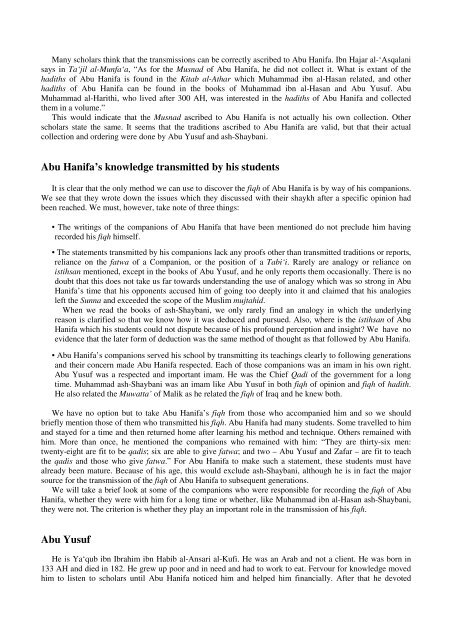You also want an ePaper? Increase the reach of your titles
YUMPU automatically turns print PDFs into web optimized ePapers that Google loves.
Many scholars think that the transmissions can be correctly ascribed to <strong>Abu</strong> <strong>Hanifa</strong>. Ibn Hajar al-‘Asqalani<br />
says in Ta‘jil al-Munfa‘a, “As for the Musnad of <strong>Abu</strong> <strong>Hanifa</strong>, he did not collect it. What is extant of the<br />
hadiths of <strong>Abu</strong> <strong>Hanifa</strong> is found in the Kitab al-Athar which Muhammad ibn al-Hasan related, <strong>and</strong> other<br />
hadiths of <strong>Abu</strong> <strong>Hanifa</strong> can be found in the books of Muhammad ibn al-Hasan <strong>and</strong> <strong>Abu</strong> Yusuf. <strong>Abu</strong><br />
Muhammad al-Harithi, who lived after 300 AH, was interested in the hadiths of <strong>Abu</strong> <strong>Hanifa</strong> <strong>and</strong> collected<br />
them in a volume.”<br />
This would indicate that the Musnad ascribed to <strong>Abu</strong> <strong>Hanifa</strong> is not actually his own collection. Other<br />
scholars state the same. It seems that the traditions ascribed to <strong>Abu</strong> <strong>Hanifa</strong> are valid, but that their actual<br />
collection <strong>and</strong> ordering were done by <strong>Abu</strong> Yusuf <strong>and</strong> ash-Shaybani.<br />
<strong>Abu</strong> <strong>Hanifa</strong>’s knowledge transmitted by his students<br />
It is clear that the only method we can use to discover the fiqh of <strong>Abu</strong> <strong>Hanifa</strong> is by way of his companions.<br />
We see that they wrote down the issues which they discussed with their shaykh after a specific opinion had<br />
been reached. We must, however, take note of three things:<br />
• The writings of the companions of <strong>Abu</strong> <strong>Hanifa</strong> that have been mentioned do not preclude him having<br />
recorded his fiqh himself.<br />
• The statements transmitted by his companions lack any proofs other than transmitted traditions or reports,<br />
reliance on the fatwa of a Companion, or the position of a Tabi‘i. Rarely are analogy or reliance on<br />
istihsan mentioned, except in the books of <strong>Abu</strong> Yusuf, <strong>and</strong> he only reports them occasionally. There is no<br />
doubt that this does not take us far towards underst<strong>and</strong>ing the use of analogy which was so strong in <strong>Abu</strong><br />
<strong>Hanifa</strong>’s time that his opponents accused him of going too deeply into it <strong>and</strong> claimed that his analogies<br />
left the Sunna <strong>and</strong> exceeded the scope of the Muslim mujtahid.<br />
When we read the books of ash-Shaybani, we only rarely find an analogy in which the underlying<br />
reason is clarified so that we know how it was deduced <strong>and</strong> pursued. Also, where is the istihsan of <strong>Abu</strong><br />
<strong>Hanifa</strong> which his students could not dispute because of his profound perception <strong>and</strong> insight? We have no<br />
evidence that the later form of deduction was the same method of thought as that followed by <strong>Abu</strong> <strong>Hanifa</strong>.<br />
• <strong>Abu</strong> <strong>Hanifa</strong>’s companions served his school by transmitting its teachings clearly to following generations<br />
<strong>and</strong> their concern made <strong>Abu</strong> <strong>Hanifa</strong> respected. Each of those companions was an imam in his own right.<br />
<strong>Abu</strong> Yusuf was a respected <strong>and</strong> important imam. He was the Chief Qadi of the government for a long<br />
time. Muhammad ash-Shaybani was an imam like <strong>Abu</strong> Yusuf in both fiqh of opinion <strong>and</strong> fiqh of hadith.<br />
He also related the Muwatta’ of Malik as he related the fiqh of Iraq <strong>and</strong> he knew both.<br />
We have no option but to take <strong>Abu</strong> <strong>Hanifa</strong>’s fiqh from those who accompanied him <strong>and</strong> so we should<br />
briefly mention those of them who transmitted his fiqh. <strong>Abu</strong> <strong>Hanifa</strong> had many students. Some travelled to him<br />
<strong>and</strong> stayed for a time <strong>and</strong> then returned home after learning his method <strong>and</strong> technique. Others remained with<br />
him. More than once, he mentioned the companions who remained with him: “They are thirty-six men:<br />
twenty-eight are fit to be qadis; six are able to give fatwa; <strong>and</strong> two – <strong>Abu</strong> Yusuf <strong>and</strong> Zafar – are fit to teach<br />
the qadis <strong>and</strong> those who give fatwa.” For <strong>Abu</strong> <strong>Hanifa</strong> to make such a statement, these students must have<br />
already been mature. Because of his age, this would exclude ash-Shaybani, although he is in fact the major<br />
source for the transmission of the fiqh of <strong>Abu</strong> <strong>Hanifa</strong> to subsequent generations.<br />
We will take a brief look at some of the companions who were responsible for recording the fiqh of <strong>Abu</strong><br />
<strong>Hanifa</strong>, whether they were with him for a long time or whether, like Muhammad ibn al-Hasan ash-Shaybani,<br />
they were not. The criterion is whether they play an important role in the transmission of his fiqh.<br />
<strong>Abu</strong> Yusuf<br />
He is Ya‘qub ibn Ibrahim ibn Habib al-Ansari al-Kufi. He was an Arab <strong>and</strong> not a client. He was born in<br />
133 AH <strong>and</strong> died in 182. He grew up poor <strong>and</strong> in need <strong>and</strong> had to work to eat. Fervour for knowledge moved<br />
him to listen to scholars until <strong>Abu</strong> <strong>Hanifa</strong> noticed him <strong>and</strong> helped him financially. After that he devoted














